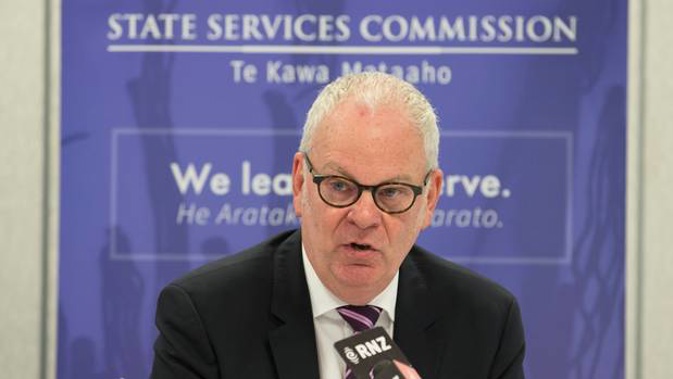
Deputy Police Commissioner Wally Haumaha's job is under pressure after a damning investigation which found his workplace behaviour towards three women was unprofessional and inappropriate.
Prime Minister Jacinda Ardern took urgent legal advice from the Solicitor-General after reading the 40-page report released today by the Independent Police Conduct Authority.
She was "very disappointed" in the findings but said the "clearly inappropriate behaviour" did not meet the threshold for Haumaha to be dismissed.
This was because of the constitutional independence of the police, said Ardern, which had to be separate from political influence.
While the threshold had not been met in this case, the Prime Minister said Police Commissioner Mike Bush would be told of her "very clear expectations" the IPCA findings should now be an employment matter.
She refused to express confidence in Haumaha, whom she appointed to the statutory role in May on the recommendation of Police Minister Stuart Nash.
"There is clearly inappropriate behaviour here. I expect the Commissioner of Police to respond appropriately."
The Independent Police Conduct Authority found that Haumaha's behaviour while heading a Māori justice project was at times unprofessional and inappropriate for a senior executive.
Some of the incidents could be described as bullying, as the word is commonly understood, but his actions did not the workplace definition which requires "persistence", the IPCA found.
The IPCA found Haumaha asserted his authority "aggressively" in an argument with one of the women by putting his leg on the chair in front of her, which was intimidating "whether it was designed to be or not".
Meanwhile, two government departments also failed to meet current State Services Commission standards when staff raised concerns about the workplace behaviour of Deputy Police Commissioner Wally Haumaha.
The review by State Services Commissioner Peter Hughes found a number of problems with how the Ministry of Justice and the Department of Corrections responded to three staff working on a joint project with the police.
Three women - two senior policy analysts from Justice and one from Corrections - walked out of Police National Headquarters in June 2016 and refused to return because of Haumaha's alleged verbal bullying.
Two of the women laid formal complaints with the police this year after the Herald broke the story in August.
The SSC did not investigate the merits of their complaints which are at the centre of a separate investigation by the Independent Police Conduct Authority.
The IPCA report was released today and found Haumaha's behaviour to be inappropriate and unprofessional at times. The findings were "damning", according to National Party leader Simon Bridges who called for the Prime Minister Jacinda Ardern to dismiss him.
/arc-anglerfish-syd-prod-nzme.s3.amazonaws.com/public/56JZEB5WPFAIND2CLZSZQPCNRU.jpg)
The women have since spoken to the Herald about the "concerning" findings of the police watchdog.
Instead, Hughes focused on how Justice and Corrections handled the concerns about Haumaha when the women first raised them.
He then measured the conduct of the two departments in 2016 against new public service standards which came into force the following year.
The three women raised issues directly with their managers on different occasions and action was taken after a particular meeting with Haumaha in June 2016.
A decision was made for the trio to leave PNHQ and continue working on the project from the Justice offices.
The project had been difficult and stressful and Haumaha was aware of rising tension within the group.
The women stressed to the SSC there were "lost opportunities" to address their concerns earlier in 2016.
"The difficulty appears to have been that - while managers were aware of some incidents and tension - the women did not feel like they appreciated the impact this was having on them," wrote Hughes.
"Both women commented that their managers had competing priorities as they were heavily invested in the substantive work of the joint project. As a result, the women felt like emphasis was placed on delivering the work of the project, as opposed to taking any steps to respond to the allegations of inappropriate workplace behaviour."
The lack of structure around their secondment to the joint project left the women uncertain as to who they could talk to.
Poor communication was a major issue identified by the SSC review.
While there was regular communication between the Justice managers and the women in the week after they made the bullying allegations in June 2016, this soon became "disjointed".
/arc-anglerfish-syd-prod-nzme.s3.amazonaws.com/public/VE2U4GK5OFC3PMTBH4RGYLT7LI.jpg)
"This culminated in a significant miscommunication concerning whether senior leadership within Police, beyond Deputy Commissioner Haumaha, would be informed about the allegation," wrote Hughes.
"The communication between the managers at Justice and Corrections also seemed to have been poor, or non-existent."
Some aspects of how Justice managers responded were good - arranging others to collect the women's belongings from PNHQ was thoughtful - there was no developed plan.
"Both women also got the sense that the managers saw the move to Justice as a convenient and fast way to resolve the issue and move on with the work of the project."
A few days later, one of the managers suggested the women should consider changing their language and behaviour around Haumaha.
"While well-meant and followed by an apology, the nature of this comment and the context [in that the women had just been informed that Deputy Commissioner Haumaha had refused to apologise…] left the women with the impression that their allegation may not have been taken that seriously after all."
Hughes found both departments did not have robust processes in 2016 and therefore would have failed to meet the current standards of today.
The issue of poor communication was extended to the women themselves and the SSC was "concerned" the complainants were not debriefed after making the allegation.
Nearly two weeks after leaving PNHQ, there was a meeting between the women and senior management.
"But there were significant miscommunications at this meeting and, it appeared to us, that the women had been left without any sense of resolution."
By contrast, the Justice deputy chief executive Colin Lynch saw the meeting as bringing the matter to a close.
He acknowledged the issues and observed Haumaha worked for the police, not Justice, so it was a matter for the Police to deal with.
The women took this to mean the police were treating it as an employment matter, so they would not receive any updates.
"But for us the most concerning issue is that, despite what was said at the meeting, no one in the senior leadership within Police [beyond Deputy Commissioner Haumaha] was told about the women's allegation until early August 2016."
Police were not told by anyone at Justice or Corrections but Louise Nicholas - a friend of one of the women - who raised it directly with Deputy Commissioner Mike Clement without revealing names.
He called Audrey Sonerson, the acting chief executive at Justice, and Christine Stevenson, the deputy chief executive at Corrections, but was left with the clear impression neither department wanted to take it further.
"The women we spoke to told us that, ultimately, they were left hanging in relation to their allegation," wrote Hughes.
The SSC said the failure to debrief and adequately support the women meant both departments failed to meet the "keeping people safe" standard now in place.
The review recommended the State Services Commission update bullying policy standards to ensure the "specific challenges represented by cross-agency projects are addressed".
/arc-anglerfish-syd-prod-nzme.s3.amazonaws.com/public/IUZW65H5AZGXLIRYB674ESD3KU.jpg)
In a statement to the Herald, Hughes said the women who raised these concerns have been through a difficult time.
"Despite this, they worked with us and were committed to improving the system and for that I thank them."
The findings by Peter Hughes - particularly the SSC concerns about Justice failing to raise the issue with Police leadership - is at complete odds with the findings of an earlier Government Inquiry.
In clearing the process which led to the appointment of Haumaha as Deputy Commissioner in May, Mary Scholtens, QC, found no problem with Justice and Corrections not making a complaint with police.
"On my understanding of the facts of the various allegations, I consider their approach was reasonable," wrote Scholtens.
Even if there had been a formal complaint, Scholtens found the likely consequence would be the concerns would have formed part of Commissioner Mike Bush's assessment of Haumaha's leadership style.
And Bush already knew Haumaha could be "forceful" and "demanding", said Scholtens, because of a blunt appraisal of his strengths and weaknesses for a previous promotion.
Scholtens characterised the bullying allegations as Haumaha's adoption of a "direct, police style-approach" to a multi-agency project, "where a more orthodox public sector approach may have been appropriate".
Her findings disappointed the two women who made complaints.
"We want to be clear; we complained," they told the Herald after the Government Inquiry was released.
"We struggled to get our complaints about Deputy Commissioner Haumaha's behaviour taken seriously. We came up against impenetrable systemic barriers."
Take your Radio, Podcasts and Music with you









